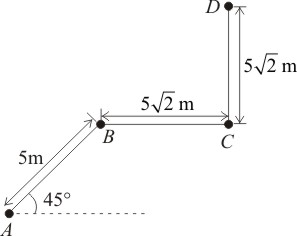Given below are two statements:
| Assertion (A): | Position-time graph of a stationary object is a straight line parallel to the time axis. |
| Reason (R): | For a stationary object, the position does not change with time. |
| 1. | Both (A) and (R) are True and (R) is the correct explanation of (A). |
| 2. | Both (A) and (R) are True but (R) is not the correct explanation of (A). |
| 3. | (A) is True but (R) is False. |
| 4. | Both (A) and (R) are False. |
A particle moves along a path \(ABCD\) as shown in the figure. The magnitude of the displacement of the particle from \(A\) to \(D\) is:

1. m
2. \(10\) m
3. m
4. \(15\) m
A drunkard walking in a narrow lane takes \(5\) steps forward and \(3\) steps backward, followed again by \(5\) steps forward and \(3\) steps backward, and so on. Each step is \(1\) m long and requires \(1\) s. There is a pit on the road \(13\) m away from the starting point. The drunkard will fall into the pit after:
1. \(37\) s
2. \(31\) s
3. \(29\) s
4. \(33\) s
If a body travels some distance in a given time interval, then for that time interval, its:
| 1. | Average speed ≥ |Average velocity| |
| 2. | |Average velocity| ≥ Average speed |
| 3. | Average speed < |Average velocity| |
| 4. | |Average velocity| must be equal to average speed. |
A car moves from \(X\) to \(Y\) with a uniform speed \(v_u\) and returns to \(X\) with a uniform speed \(v_d.\) The average speed for this round trip is:
| 1. | \(\dfrac{2 v_{d} v_{u}}{v_{d} + v_{u}}\) | 2. | \(\sqrt{v_{u} v_{d}}\) |
| 3. | \(\dfrac{v_{d} v_{u}}{v_{d} + v_{u}}\) | 4. | \(\dfrac{v_{u} + v_{d}}{2}\) |
The figure gives the \((x\text-t)\) plot of a particle in a one-dimensional motion. Three different equal intervals of time are shown. The signs of average velocity for each of the intervals \(1,\) \(2\) and \(3,\) respectively are:

| 1. | \(-,-,+\) | 2. | \(+,-,+\) |
| 3. | \(-,+,+\) | 4. | \(+,+,-\) |
The coordinate of an object is given as a function of time by \(x = 7 t - 3 t^{2}\), where \(x\) is in metres and \(t\) is in seconds. Its average velocity over the interval \(t=0\) to \(t=4\) is will be:
1. \(5\) m/s
2. \(-5\) m/s
3. \(11\) m/s
4. \(-11\) m/s
A particle moving in a straight line covers half the distance with a speed of \(3~\text{m/s}\). The other half of the distance is covered in two equal time intervals with speeds of \(4.5~\text{m/s}\) and \(7.5~\text{m/s}\) respectively. The average speed of the particle during this motion is:
1. \(4.0~\text{m/s}\)
2. \(5.0~\text{m/s}\)
3. \(5.5~\text{m/s}\)
4. \(4.8~\text{m/s}\)
The displacement \((x)\) of a point moving in a straight line is given by; \(x=8t^2-4t.\) Then the velocity of the particle is zero at:
| 1. | \(0.4~\text s\) | 2. | \(0.25~\text s\) |
| 3. | \(0.5~\text s\) | 4. | \(0.3~\text s\) |
If the velocity of a particle is \(v=At+Bt^{2},\) where \(A\) and \(B\) are constants, then the distance travelled by it between \(1~\text{s}\) and \(2~\text{s}\) is:
| 1. | \(3A+7B\) | 2. | \(\frac{3}{2}A+\frac{7}{3}B\) |
| 3. | \(\frac{A}{2}+\frac{B}{3}\) | 4. | \(\frac{3A}{2}+4B\) |






